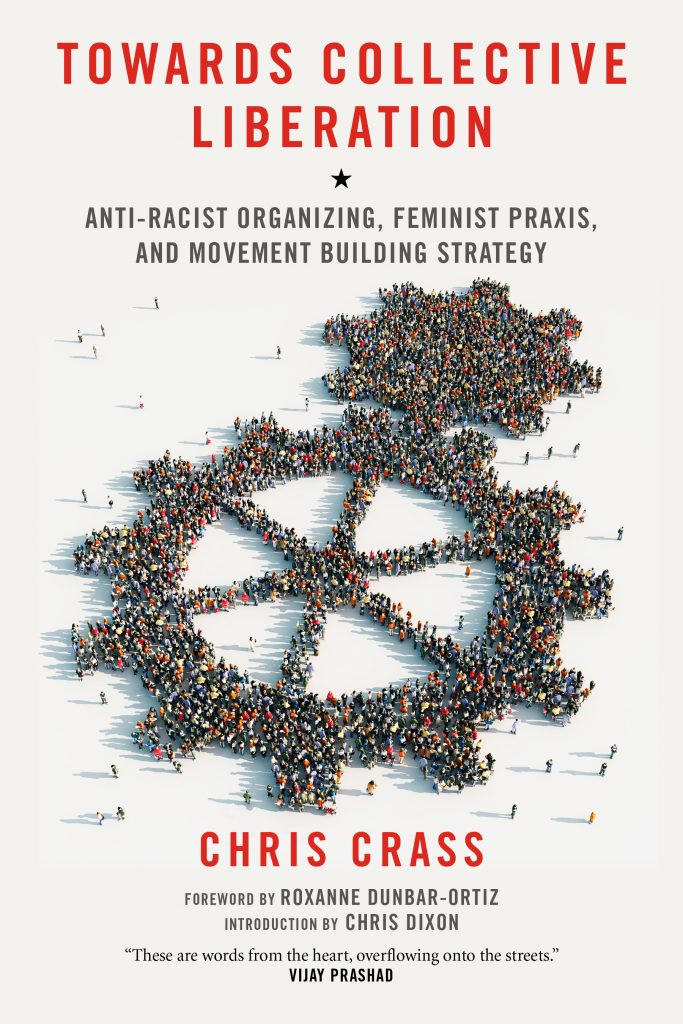
by James Tracy
Left Eye Books
March 25th, 2013
Towards Collective Liberation: Anti-Racist Organizing, Feminist Praxis and Movement Building Strategy, may be the “Rules for Radicals” for a growing trend of anarcho-practicos who up until this point have had little literature to make their case with.
Chris Crass is an anarchist organizer. For those whose perception of anarchism begins and ends with broken windows, this may seem like an oxymoron. The tradition has a tortured relationship with organizing. Anarchism’s fingerprints can be found on many of the important social movements since the late 1980s; ranging from the AIDS activism of ACT-UP to the anti-nuclear and Global Justice Movements. Other currents within the anarchist tradition hold organizing leads to hierarchy, compromise and cooptation. The anti-organizing voice of anarchism is at its most articulate in recent tracts such as “The Coming Insurrection” and a wealth of books and manifestos from the Crimethinc collective.
Crass walks anarchism down a very different road. His anarchism, and that of the political organizations he helped build, isn’t afraid of community organizing. It also isn’t afraid to reach across the radical aisle and work with marxists, feminists, liberals and just about any other category that makes it to the meeting. His new book, Towards Collective Liberation: Anti-Racist Organizing, Feminist Praxis, and Movement Building Strategy may be the “Rules for Radicals” for a growing trend of anarcho-practicos who up until this point have had little literature to make their case with. (In 1993, Tom Knoche formulated a case for anarchist participation in reform organizing, see Organizing Communities in the journal Social Anarchism.)
Towards Collective Liberation is an impressive contribution to radical thought. Crass outlines a vision of anarchism rooted deeply in the anti-racist tradition, and influenced by feminism.
He’s most at home when teasing out the lessons of his own politicization. The exploration of Food Not Bombs (FNB) is a delightful surprise—combining a sober assessment of the movement’s weaknesses with a nuanced description of their accomplishments under fire during San Francisco’s War For Space. Here, he carefully avoids demonizing FNB personalities who made destructive mistakes, but pulls no punches in the final analysis. He sets a high bar for constructive discourse without stooping to polemics.
His ability to grapple with the complexities of the Civil Rights Movement and draw implications for anti-authoritarians is unique. Instead of approaching social movements in terms of all-or-nothing reductionism Crass identifies ways for radical organizers to engage with them and think outside the Infoshop.
The book isn’t without some key weaknesses. In some essays, Crass’ over-reliance on jargon obscures his otherwise salient power of observation. He raises important points, “we need a revitalized, dynamic, and visionary Left politics that draws from many traditions, not just anarchism, but also Marxism, feminism, revolutionary nationalism and others;” then only scratches the surface of the mechanics of doing so.
Other themes left under-examined are the strengths and weaknesses of the interventions his organization, the Catalyst Project made in the name of racial justice in key moments such as the response to hurricane Katrina and the immigrant rights upsurge. I find it odd that the process of committed anarchists traveling to other cities in order to challenge “white supremacy” in the movement didn’t yield deeper reflection. What were the moments when this strategy bolstered local organizing? When was it unwelcome by locals? Did it ever feel a bit vanguardist, and if so, what was to be done?
Thankfully, Crass’ has a political vision of anti-racism, separated from individualistic notions of white guilt and “invisible back packs.” He recognizes white supremacy as a system and a historic roadblock to social transformation. While centering race and colonization, he also avoids reducing race to the only dilemma facing organizers today. In this sense, he snatches anti-racism from the jaws of the professional diversity trainers polluting today’s discourse.
Taken as a whole, the book makes the case for an anarchist practice relevant to, and a part of, the lives of everyday people, and the larger Left. With humility and optimism, Crass offers critical insights hard won through a life on the frontlines. “Towards Collective Liberation” is an important read, not just for anarchists, but anyone pondering the road forward.
James Tracy is a native of Oakland, California and a long-time economic justice organizer. He is the co-author of Hillbilly Nationalists, Urban Race Rebels, and Black Power: Community Organizing in Radical Times (Melville House).






